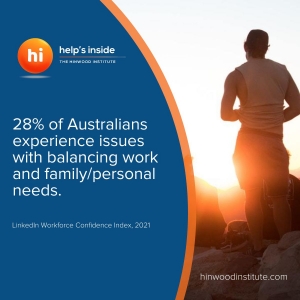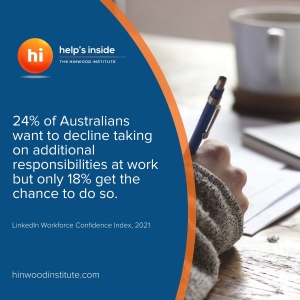 Australian workers are feeling increasingly stressed. According to the LinkedIn Workforce Confidence Index, 60% of employed workers experienced workplace stress in the last month. Now that’s up from 16% at the end of last year. 60% is a massive amount of Australia’s workforce.
Australian workers are feeling increasingly stressed. According to the LinkedIn Workforce Confidence Index, 60% of employed workers experienced workplace stress in the last month. Now that’s up from 16% at the end of last year. 60% is a massive amount of Australia’s workforce.
There is no doubt that this stress is being felt across the entire workforce. However, women were more likely to say that they felt stress. Compared to the 60% of men that felt stressed, 72% of women felt stressed in the Australian workforce.
So what is driving this workplace stress? The survey asked people for their top three sources of job-related stress. Obviously, there were ongoing lockdowns and the changing nature of work. But a third of respondents said that there is not enough time to get everything done. 28% experienced issues with balancing work and family, while a quarter mention not making enough money.
 When it comes to relieving that stress, 50% of Australians said that they were interested in taking some time off work. Women (40%) were more likely than men (34%) to take breaks during the day. 20% of women wanted to take advantage of the company provided mental health benefits compared to 11 % of men. But, what people want isn’t what people always get. The survey found that 50% of workers were interested in taking time off. But only 42% had the opportunity to do so. 24% of people wanted to decline to take on additional responsibilities, yet, only 18% would actually go on to do so.
When it comes to relieving that stress, 50% of Australians said that they were interested in taking some time off work. Women (40%) were more likely than men (34%) to take breaks during the day. 20% of women wanted to take advantage of the company provided mental health benefits compared to 11 % of men. But, what people want isn’t what people always get. The survey found that 50% of workers were interested in taking time off. But only 42% had the opportunity to do so. 24% of people wanted to decline to take on additional responsibilities, yet, only 18% would actually go on to do so.
These statistics are a real eye-opener! Here are the things it tells me:
1. Some things haven’t changed
People still want to escape as a solution. Before COVID, we would do things like going on a holiday, camping, or on a cruise where we were forced to detox from work. Now, people just want to take some time off.
2. Skills that people need to develop to manage workplace stress
 There is a desperate need to develop certain skills that boost health and well-being. People are feeling stressed by not having enough time to do things. That suggests that people need to master the art of prioritisation. Sometimes you need to be ruthless about what you put before others things – and how much time you will spend on those things
There is a desperate need to develop certain skills that boost health and well-being. People are feeling stressed by not having enough time to do things. That suggests that people need to master the art of prioritisation. Sometimes you need to be ruthless about what you put before others things – and how much time you will spend on those things
All of us can benefit from learning how to use stress when we need it. Stress can be helpful. At the same time, we need to be aware of when we need to turn that stress off. At work, tasks and responsibilities come flying at us all the time. All of us need to know how to manage things in the heat of the moment. Going on a holiday will certainly help destress, but the issues that we face will still be there once you get back to work. Being able to manage ongoing workplace stress in the moment is vital to regulating stress.
3. Importance of saying no
 It is important for people to learn how to say no without being dismissive, aggressive or defensive. People need to learn how to push back on additional responsibilities for their own well-being. There are a number of different ways we can say no.
It is important for people to learn how to say no without being dismissive, aggressive or defensive. People need to learn how to push back on additional responsibilities for their own well-being. There are a number of different ways we can say no.
I’m really interested to hear your thoughts on these statistics. Does it ring true for you? Do you relate to these statistics? What are your experiences of workplace stress in the last six months? I would love to know what you think regarding this. Please leave your thoughts in the comments below.
Dos:
- Say no when you have to
- Prioritise
- Manage your stress
Don’ts:
- Let stress bring you down
- Lose track of what’s important
- Take on responsibility when you don’t want to
Listen to the Podcast here
P.S. If you’re a business leader (Executive Management, Business Owner etc.) and you’d like more advice, tips, and information on managing time, stress & wellbeing, join our Facebook tribe of Resilient Leaders -Managing Time, Stress & Wellbeing.
About the Author:
 Barbara Clifford (The Time Tamer) is a co-founder of The Hinwood Institute. She is the lead trainer and coach in Time Management. She is a recognized leader in Stress Management. An experienced coach, speaker, columnist and facilitator, Barbara’s work with The Hinwood Institute assists people to unclutter mess, make order from chaos, and swap the shackles of overwhelming for freedom. Barbara’s clients move from the relentless hamster wheel to waking inspired, motivated, making decisions with purpose and achieving peak performance. She lives in the desert of Alice Springs, Australia working with people around the country.
Barbara Clifford (The Time Tamer) is a co-founder of The Hinwood Institute. She is the lead trainer and coach in Time Management. She is a recognized leader in Stress Management. An experienced coach, speaker, columnist and facilitator, Barbara’s work with The Hinwood Institute assists people to unclutter mess, make order from chaos, and swap the shackles of overwhelming for freedom. Barbara’s clients move from the relentless hamster wheel to waking inspired, motivated, making decisions with purpose and achieving peak performance. She lives in the desert of Alice Springs, Australia working with people around the country.
Her professional experience has included contracts with small business, Not For Profits, Aboriginal Organisations, Media, Marketing, Aged Care, Universities, Health Services and Cruise Ships



